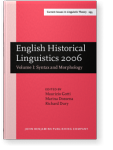On the position of the OE quantifier eall and PDE all
This paper, through a study of the corpus of Ælfric’s Catholic Homilies, shows that the quantifier eall in Old English exhibited the same distributional properties as the quantifier all in present-day English: (i) eall can float from a nominative noun phrase (NP) it modifies; (ii) eall can float from an accusative NP when it is followed by a predicative complement; and (iii) the ‘pronoun-quantifier’ order is more frequent than the ‘quantifier-pronoun’ order. The paper also argues that the quantifier eall is base-generated as the head of the Quantifier Phrase (QP) and selects an NP as its complement. The ‘full-NP-quantifier’ order can be derived by adjoining the NP to the QP. However, this operation is not applied to an NP in the argument position, due to the ban on adjunction to arguments. Unlike NPs, pronouns are adjoined to the head of a QP, yielding the ‘pronoun-quantifier’ order more freely.
